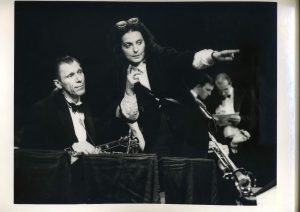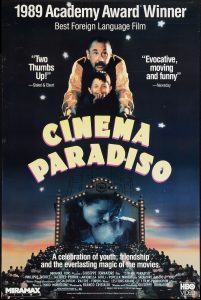Cinema – Film Series
Now living in the northern suburbs of Chicago, she was on hand to offer insights into the creation of all four of the films in the series.
The films in the series were as follows:
“Cinema Paradiso”
“Lungo il fiume” (Along the River)
“La casa rosa” (The Pink House)
“Detective per caso” (The Accidental Detective)
The dates for the 2018 Spring Film Series will be posted when they become available.
Vanna Paoli
by Pam diFiglio
Director Vanna Paoli has been working with Italy’s cinema greats for four decades and she has trusted her instincts every step of the way, whether she’s choosing a promising young actor for a fictional work or tracking down a 96-year-old subject for a documentary.
four decades and she has trusted her instincts every step of the way, whether she’s choosing a promising young actor for a fictional work or tracking down a 96-year-old subject for a documentary.
Those instincts led her to team up with Giuseppe Tornatore to co-write the script for “Cinema Paradiso,” which won an Oscar in 1989. They’ve also guided her as she directed nine films of her own, some of which will be screened at Casa Italia this fall.
The cinematic stars aligned for Paoli in 1976 when she graduated from the University of Bologna and was admitted to the Centro Sperimentale di Cinematografia, a prestigious film school in Rome. Instructors included some of the most storied names in Italian cinema — Fellini, Antonioni, Zeffirelli and Scola.
After making a handful of short films, she trained her lens on the street performers of Sicily, crafting a series titled “Il gioco, la vita, la risata” that aired on RAI. The project brought her together with Tornatore, who was working for RAI in Sicily at the time. Young, energetic and consumed by their mutual passion for cinema, they became fast friends.
Paoli continued making shorter works for RAI, including “I re maghi,” about magicians, and “Stelle, Stellacce Stelline…” about actors performances in teatro di varietà, an art form that had died out about 20 years before she began production in 1985.
When Paoli and Tornatore found themselves working in Rome, they became roommates to save on rent.
“He and I used to sit in the kitchen and talk for hours about cinema,” she recalls. “When he wanted to make ‘Cinema Paradiso,’ he said, ‘You’re the only person I can write this movie with because you know me, and this is my history.’”
The landmark film reflects Tornatore’s experience as a teenage movie projectionist in Bagheria, Sicily. He wrote the first half of the script, she wrote the second half, and they revised all the parts together. When the original producer, Goffredo Lombardo, gave it the thumbs down, Tornatore turned to Franco Cristaldi to produce the film.
“Cristaldi said it was the best script he’d seen in 10 years,” recalls Paoli, who used her extensive knowledge of film history to choose the classic American movies clips used in “Cinema Paradiso.”
With the Oscar-winning film on her resume, Paoli directed her first feature-length film, “Lungo il fiume” (Along the River) in 1988-’89. Moody and atmospheric, it takes its time in building the story of a young couple that kidnaps a child for money, and the sage who helps them recover their human decency.
Next up was “La casa rosa” (The Pink House), which follows a young Italian woman who inherits a home, and a history, when the government of Czechoslovakia returned state-owned property to their owners in 1989.
By 2003, Paoli had her pick of young Hollywood talent in casting “The Accidental Detective.” She chose David Kriegel, who had amassed dozens of acting credits, but had yet to star in a feature film.
In 1997, she flew to Chicago for a film festival screening of “La casa rosa,” staying to teach at the University of Chicago for three months. “The moment my foot hit the ground at O’Hare, I had this thought enter my mind — ‘I’m home,’” she says. Her figurative home became a literal one when she met and married noted non-fiction writer Jay Pridmore and the couple settled in the northern suburbs.
Paoli frequently travels to Italy, where she recently tracked down a 96-year-old director in a town in the Alps for her next project, a film that will highlight some of the immensely talented people who have been behind the camera in recent decades.
“Cinema is something you do because you love it,” Paoli reflects. “I’m proud and happy about all the films I made. I made them the way I wanted to make them — I never made a compromise.



 Vanna Paoli. A co-writer of the Oscar-winning “Cinema Paradiso,” Paoli went on to direct nine films of her own. (See profile below.)
Vanna Paoli. A co-writer of the Oscar-winning “Cinema Paradiso,” Paoli went on to direct nine films of her own. (See profile below.)